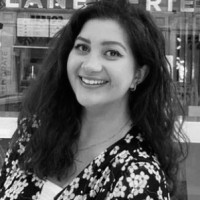
An Arab perspective on the UK's 'hostility towards Arabs'
A poll released on Monday showed a chilling resentment of Arab and Muslim populations in the UK. The poll, commissioned by YouGov and Arab News showed that 55 percent of Britons supported the racial profiling of Muslims and that 69 percent thought the UK should take in fewer refugees from Syria and Iraq.
Nearly 52 percent of those polled also associated the Arab world with strict gender roles and only 28 percent believe migration from the Arab world has been beneficial to the UK. In contrast, 64 percent believe Arabs have failed to integrate.
Despite the surge in Islamophobia and tensions towards Arab populations in the UK, both British and otherwise, seeing the statistics on paper remains relatively startling. To many Arabs and Muslims, it solidifies the hostility with substantial statistics.
What is scarier, is the way in which the wider public is able to succumb to stereotypes and view the Arab in Britain through the lens of abstracts and stereotypes. It reaffirmed that Arabs and Muslims are at large viewed in the monochromic spectrum of being perpetrators of violence and victims of war.
This serial misunderstanding which imposes a certain identity on Arabs and Muslims in Britain helps no-one. It silences and victimises Arabs and Muslims, perpetuating a dangerous narrative which has motivated Islamophobic and other forms of xenophobic hate crimes.
Though, outside of the safety and security of Arabs and Muslims in Britain, this imposition of an identity which creates a divide in British society means our identities must be somewhat hidden from the public sphere. It is almost as though, to be accepted, our Middle Eastern heritage, and our Islam, if we choose to practice, is something we keep out of the public to not cause hostility, or to make others uncomfortable.
I lived with this growing up. Being born and raised in London of both a British and Palestinian heritage, I used to find myself speaking Arabic at home and English at school. After 9/11, my family made it somewhat intentional, advising me to not bring my Arab and Muslim heritage into the public sphere to avoid unnecessary clashes and not provoke racism. Despite this, I still went to an Arabic Saturday school to make sure I understand the language and culture.
In retrospective, they were only trying to protect the 8-year-old girl in front of them as did pretty much every other Arab and Muslim family we knew at the time did. The discourse surrounding Arabs and Muslims soured so fast that many parents tried to be as protective as possible.
Even until today, when I find myself running into old classmates, I find it strange when I realise how little people knew about my racial and religious background.
Being light skinned and having what is commonly perceived a Western name, it was easy for me to blend in and I continued to do so throughout my teenage years. Despite this, when the “secret” that I am Palestinian and Muslim came out, I almost felt the burden of responsibility to prove that I am able to integrate into the only country I have lived in, to others around me.
It became tiring. I used to feel as though it was my responsibility to prove that I do not hate Jews because I am Palestinian and I do not agree with the 9/11 bombings because I am Muslim. I felt lucky for being “white passing” and that I do not adhere to the hijab, because it meant things were easier. I was able to hide and people saw me for who I am rather than where I am from. Little did I like to admit, where I am from is a core part of who I am.
I grew, and so did my ideas and my connection with my heritage. I became unapologetically Palestinian and Muslim, at absolutely no cost to my British identity and managed to unlearn the internalised racism that was built in me for the sole purpose of protecting me. I went from wanting to forget my Arabic tongue, and actively trying to do so, to embracing the Arabic language and proactively trying to improve it.
Though, not much has changed with the way people interact with me. Those who choose to discriminate will always do so. While it is naïve to deny there is a problem with integration, the term has become so ambiguous and so widely used that people who do not eat pork, or prefer halal meat can be deemed by some to be insulting to “British values”.
Those who want to listen will listen, and those who do not, will not. Rather than addressing perceived root problems that perpetuate the racist discourse like integration and radicalisation, the root of these statistics lie with ignorance and an inability for the person uncomfortable with the Arab or Muslim in front of them to talk, but also the unlearning and un-internalising the racism for Arabs and Muslims to feel as though they can safely talk about their heritage and debunk stereotypes.
![Palestine expo [Getty] Palestine expo [Getty]](/sites/default/files/styles/large_16_9/public/media/images/C01017F5-ACBB-4C97-913C-D856F58C46A3.jpg?h=d1cb525d&itok=XBkKssCg)



